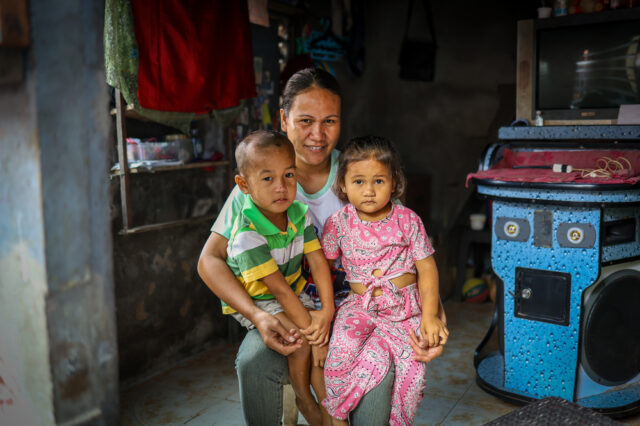
The first of its kind
MANILA, 23 April 2025 – In a global first, the Philippines has introduced a benefit package that fully covers outpatient treatment for severe malnutrition through its national health insurance program. Developed by the Philippine Health Insurance Corporation (PhilHealth), the Severe Acute Malnutrition Outpatient Therapeutic Care Benefit Package gives families access to medical care, nutrition counseling, and ready-to-use therapeutic food—all free of charge.
Infants under six months are covered for up to PHP 7,500 (USD 129), while children under five can receive up to PHP 17,000 (USD 293) in support. Before this, access to treatment often depended on what families could afford or how far they lived from the nearest health center. With this new package in place, around 100,000 children each year are expected to benefit from free, life-saving care.
This milestone builds on years of work to strengthen how the country prevents, detects, and treats malnutrition especially in rural and hard-to-reach areas. The package was developed with technical support from UNICEF and in close partnership with the Philippine government. Funding from the UK Government helped model the approach and bring it to more communities. These changes are helping turn a national policy into real support for families, especially those who have long been hardest to reach.
The long road to treatment
In many remote communities in the Philippines, reaching a health center can take hours. Families cross rivers, walk long distances, or ride a habal-habal or motor tricycle along rough, unpaved roads—often with a sick child in their arms.
Malnutrition is one of the most common reasons they seek help. Across the country, about one in every three children does not get the nutrition they need to grow, stay strong, and keep up in school. Some lack food entirely. Others eat regularly but miss out on essential nutrients.
Wasting is what happens when a child becomes dangerously thin from lack of proper nutrition. Nearly 600,000 children are affected, and for those already facing illness or poverty, the condition can worsen in just a few days. Severe malnutrition is the most critical stage of wasting. At this point, a child’s body becomes so weak that it can no longer fight off infection or recover from common illnesses. Without timely treatment, it can be fatal.
Making sure no child is left behind
National and local governments have taken important steps to improve how malnutrition is found and treated. But real progress still depends on the people who are closest to the ground—those who see children every day and are often the first to recognize when a child needs care.
In barangays across the country, barangay nutrition scholars screen children, visit homes, and refer families to health centers when care is needed. They are often the first to take action, even with limited support. Many work with modest incentives and rely on the few resources available to local governments or health units. Some cannot afford to travel to remote sitios (smaller villages). Others have served their communities for decades, often without anyone younger stepping in to take their place.
Without stronger support for community health workers, some children may miss their chance to be treated before it is too late.
Bringing treatment closer to every child
Children with SAM, like Niño Elohim, can recover with proper care—thanks to Dr. Dana’s guidance, Jeny Openiano’s son is now thriving. © UNICEF Philippines/2025/Renz Posedio
In Catarman, Northern Samar, the rollout of this new benefit package is already helping frontline health workers care for children with malnutrition. With better training and access to supplies, local teams are able to respond more quickly and follow through with treatment.
“UNICEF is really doing a good job,” says Dr. Blessie Dana Noroña, Municipal Nutrition Action Officer. “You’re actually providing us with overall assistance—in policies, in our commodities. The help that you extend doesn’t go to waste.”
For families, the package means not having to choose between their child’s health and their daily needs. For health workers, it means having the tools to act early, spotting malnutrition before it becomes severe, and making sure recovery can continue beyond the health center.
But the package will only reach its full potential if more communities can access it. Health facilities must be accredited to provide treatment. That involves training staff, maintaining a steady supply of therapeutic food, and putting systems in place to follow up with every child. Local governments are in a strong position to lead this next step.
“It’s a first in the world for a health insurance [program] to cover nutrition,” says Joanna Manalili, Chief Social Insurance Officer at the PhilHealth office in Catarman. “We need to work together to make sure no child, no family, and no community is left behind.”
Spreading the word is just as important. In many areas, parents still do not know that this kind of treatment is now available—and free.
What comes next
Now that the foundation is in place, local governments and health centers have an opportunity to turn this policy into something more: real, everyday access to care. Good coordination—and strong commitment—can help more children get treated early and grow up healthy.
“The UK’s support has helped build a system that protects children—today and for the future,” says Alice Nkoroi, Nutrition Manager at UNICEF Philippines. “Sustained support will ensure more children receive life-saving care and fewer families face the fear of losing a child to malnutrition. Because every child deserves to survive and thrive.”
For every child, help within reach.



